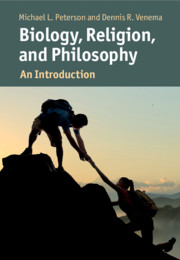Book contents
- Biology, Religion, and Philosophy
- Cambridge Introductions to Philosophy and Biology
- Biology, Religion, and Philosophy
- Copyright page
- Dedication
- Contents
- Acknowledgments
- Introduction
- Part I General Issues
- Part II Religion and Human Biology
- 6 Human Nature and Human Uniqueness
- 7 Love and Altruism in Biology and Religion
- 8 Biology, Ethics, and Debunking Arguments
- 9 Biological Accounts of Religion
- 10 Humanity, Religion, and the Environment
- Glossary
- Further Reading
- Index
9 - Biological Accounts of Religion
from Part II - Religion and Human Biology
Published online by Cambridge University Press: 25 March 2021
- Biology, Religion, and Philosophy
- Cambridge Introductions to Philosophy and Biology
- Biology, Religion, and Philosophy
- Copyright page
- Dedication
- Contents
- Acknowledgments
- Introduction
- Part I General Issues
- Part II Religion and Human Biology
- 6 Human Nature and Human Uniqueness
- 7 Love and Altruism in Biology and Religion
- 8 Biology, Ethics, and Debunking Arguments
- 9 Biological Accounts of Religion
- 10 Humanity, Religion, and the Environment
- Glossary
- Further Reading
- Index
Summary
Historically, many thinkers have assumed that religion has a natural origin, but today researchers in the biosciences typically assume that its natural origin falls within the scope of evolutionary theory. For all scientific theories of religion, the general aim has always been to identify empirically the causal processes that operate in all human behaviors that are manifested in the phenomenon of religion. In our day, sociobiologists, evolutionary psychologists, and neuroscientists have advanced theories about the evolutionary causes of religious cognition and behavior. Although the life and behavioral sciences are becoming increasingly unified under the overarching paradigm of evolutionary theory, a consensus on the evolutionary explanation of religion – its development and function – may not quite yet be on the horizon.
- Type
- Chapter
- Information
- Biology, Religion, and PhilosophyAn Introduction, pp. 205 - 227Publisher: Cambridge University PressPrint publication year: 2021

